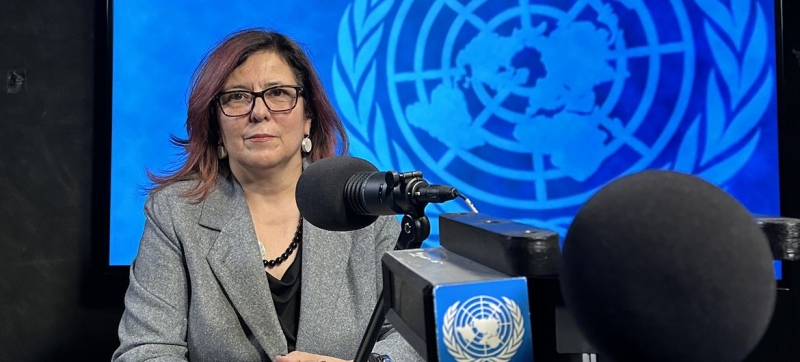Indigenous peoples of Russia are threatened with “extinction” because they have been “massively” mobilized to fight in the war against Ukraine, Katsarova said. According to her, the mobilization of representatives of minority communities was largely forced.
“The mobilization of indigenous peoples, especially those from small ethnic groups, is massive, and the mortality rate is enormous, threatening their extinction,” the Special Rapporteur said, citing data from civil society organizations.
Katsarova said that since Russia’s full-scale invasion in February 2022, she has seen “almost no Slavic faces” in images broadcast from the front lines, but rather the faces of indigenous peoples of Russia.
“These were Buryats, these were Kalmyks, these were Chechens – these were Russia’s national minorities,” she said.
“In Moscow and St. Petersburg, the mobilization was not so brutal,” Katsarova added, explaining that residents of these large cities “know their rights,” unlike residents of remote regions that “don’t feel like they have a choice.”
The independent human rights expert said there had been documented cases of troops going door-to-door in villages looking for indigenous recruits. She also said people were being “lured” with promises of decent wages because “in many parts of Russia, people are quite poor.”
Recruitment of Prisoners and Rise in Violence Against Women
Representatives of “vulnerable groups” are being recruited to fight in the war, often under duress, Katsarova continued. In addition to indigenous peoples, she said, these include migrants and prisoners.
She noted that about 170,000 criminals convicted of violent crimes were sent to fight in Ukrainian territory in exchange for pardons or reduced sentences. Many of those who return, Katsarova emphasized, commit crimes against women and children, including rape and murder.
“Because of this, the level of violence against women, which was already high, has increased. Every year, thousands of women die as a result of domestic violence and other forms of violence… However, there is no law in Russia that criminalizes domestic violence or gender-based violence,” she noted.
“Shocking” prison terms for dissent and anti-war activity
According to Katsarova, Russians receive “shockingly long prison terms” for speaking out against the war: “seven years for reading a poem, saying a prayer, or staging a play that is perceived as anti-war,” “seven years for posting on social media.”
Peaceful demonstrators, according to the Special Rapporteur, are arrested, and many are beaten by the police. They are subjected to torture and cruel treatment in places of detention.
“Anti-war activists are being punished with forced psychiatric treatment. This is very reminiscent of the practice against Soviet dissidents and human rights activists in Soviet times,” Katsarova noted.
Some journalists, the independent expert said, were given sentences of up to 22 years “on fabricated charges and as a warning to others” to adhere to the “state version of reality.” More than 500 people were held accountable for disseminating “fake news.” Many journalists were forced to flee the country, and most independent media outlets closed or moved abroad. There are more than 1,300 political prisoners in Russian prisons, Katsarova said.
Violations against Ukrainians
Regarding the war on the territory of Ukraine, according to the expert, the Russian authorities have violated a wide range of international human rights and humanitarian law.
Ukrainian servicemen captured by the Russian armed forces do not have the status of prisoners of war, and are therefore de facto not protected by the Geneva Conventions, the Special Rapporteur noted.
In addition, more than 1,600 Ukrainian civilians detained by the Russian armed forces are currently in custody.
“Reports from those released in prisoner exchanges describe appalling conditions in Russian prisons, where torture, rape and sexualized violence are widespread,” the Special Rapporteur said. Katsarova.
She also recalled the deportation of 19,000 Ukrainian children to Russian territory. According to the information she received, only 388 children were returned.
Civilians of Kursk Oblast “Trapped”
As a result of the invasion of Ukrainian troops into Kursk Oblast in August, “desperate civilians” found themselves “trapped” between the two warring parties, Katsarova said.
“Various requests were received from these civilians. We do not know their exact number, according to some estimates, in particular, according to information received from Sudzhansky District, 369 civilians were trapped. Other estimates put the number at 698 civilians, some even say up to 1,000 civilians,” the Special Rapporteur said.
“They are turning to their own government. They are turning to the Red Cross (ICRC), to us as the United Nations, to my mandate, to the High Commissioner for Human Rights, to the UN Secretary-General. And they are asking for a humanitarian corridor. We are monitoring the situation with these civilians,” she added.
Katsarova expressed hope that the ICRC and the UN will be given access to these civilians and that they will be given the opportunity to evacuate.
*Special Rapporteurs are part of the so-called Special Procedures of the Human Rights Council. They are not UN staff and do not receive a salary for their work. They are independent from any government or organization and serve in their individual capacity.

